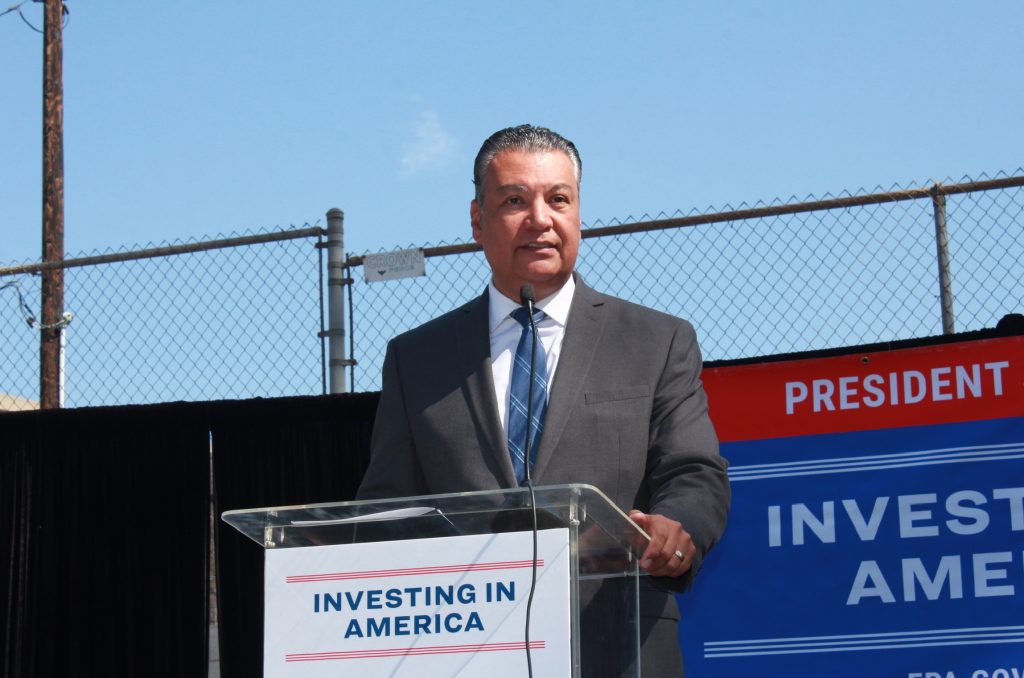
COMMERCE, CA — Today, U.S. Senator Alex Padilla (D-Calif.) was joined by senior leadership from the Environmental Protection Agency (EPA), the California Air Resources Board (CARB), and the South Coast Air Quality Management District (South Coast AQMD) to announce nearly $500 million for South Coast AQMD, which will help decarbonize the transportation and freight sectors and improve air quality for Southern California residents. This historic funding comes as part of the EPA’s Climate Pollution Reduction Grants (CPRG) program and was made possible by the Inflation Reduction Act, which Padilla supported.
Padilla led EPA officials on a tour of freight transportation operators in the Inland Empire to experience firsthand the effects of air pollution in the region and discuss opportunities for continued collaboration to transition to a zero-emission transportation sector. The tour included a visit to WattEV in San Bernardino, the Inland Empire’s first heavy-duty truck charging depot.
“Today’s historic half a billion dollar investment marks a consequential step in curbing the harmful effects of toxic air pollution for current and future generations,” said Senator Padilla. “Southern California is the heart of our nation’s goods movement, and by making these crucial investments in zero emission infrastructure, we are one step closer to protecting our planet, decarbonizing the heavy-duty sector, and improving air quality for underserved communities who for too long have been left behind.”
This CPRG investment will slash emissions generated by goods movement near the Ports of Los Angeles and Long Beach (San Pedro Ports) by incentivizing the development of zero-emission vehicle charging equipment, zero-emission freight vehicles, battery electric cargo equipment, and electric switcher locomotives.
“With the Inflation Reduction Act’s Climate Pollution Reduction Grants program, the Biden-Harris Administration is empowering community-driven solutions to fight climate change, protect public health, and grow our economy,” said Joe Goffman, Assistant Administrator for EPA’s Office of Air and Radiation. “With these CPRG funds, the South Coast’s INVEST CLEAN project will catalyze transformative change for the Southern California goods movement corridor by addressing the most significant challenges to deploying zero emissions vehicles and equipment. This targeted strategy will reduce GHGs and air quality and hazardous air pollutants to protect public health, especially in low-income and over-burdened communities. INVEST CLEAN will also support economic development and job creation.”
“The Climate Pollution Reduction Grants being unveiled today will deliver unprecedented resources to states, local governments, and Tribes — here in Southern California and across the U.S. — for local solutions that can provide national examples to accelerate the needed transition off of fossil fuels,” said EPA Pacific Southwest Regional Administrator Martha Guzman. “These efforts will create jobs, reduce the emissions fueling climate change, and clean up the dirty, dangerous air that too many already overburdened communities have breathed for too long.”
“The goods movement in California is an economic pillar and investments in moving the sector toward zero-emissions technology will pay off in clean air and a healthier future, especially for communities that for far too long have been at the frontlines of pollution,” said CARB Chair Liane Randolph. “The award also represents an important partnership between federal, state and local agencies to accelerate solutions that tackle climate change and reduce pollution.”
“We are so grateful for this award which is the largest in our agency’s history and one that underscores the needs of our communities,” said Vanessa Delgado, Chair of South Coast AQMD’s Governing Board. “Over the next 25 years, these funds will help reduce 12 million metric tons of carbon emissions. On top of that, 1600 tons of smog forming emissions will be avoided annually while creating green jobs and fostering economic growth.”
In total, EPA awarded 25 applicants a combined $4.3 billion through the CPRG program to implement community-driven solutions that tackle the climate crisis, reduce air pollution, advance environmental justice, and accelerate America’s clean energy transition. When combined, the proposed projects would reduce greenhouse gas pollution by as much as 971 million metric tons of carbon dioxide equivalent by 2050, roughly the emissions from 5 million average homes’ energy use each year for over 25 years.
Senator Padilla has consistently fought for emissions reductions across the freight sector. Earlier this year, Padilla successfully pushed the Administration to launch a National Zero-Emission Freight Corridor Strategy to guide the national deployment of zero-emission medium- and heavy-duty freight transportation vehicle (ZE-MHDV) charging and fueling infrastructure, which followed his efforts to call on the Joint Office to prioritize the deployment of ZE-MHDV as part of its core mission. Additionally, Padilla recently applauded the EPA’s release of the strongest national greenhouse gas standards in history for HDV emissions to begin in model year 2027, following a series of efforts he led. He also applauded the Biden-Harris Administration’s announcement of the first-ever national goal to transition to a zero-emissions freight sector for the truck, rail, aviation, and marine industries, along with a commitment to develop a national zero-emissions freight strategy. Last year, Padilla led 23 members of California’s Congressional delegation in urging federal agencies to advance a whole-of-government strategy to address California’s unique air quality challenges.
Senator Padilla also believes investing in clean energy projects and increased efficiency at ports like the Ports of Long Beach and Los Angeles is vital for both economic growth and environmental protection. Recently, Padilla announced over $112 million for the San Pedro Ports through the FY 2024 U.S. Army Corps of Engineers Work Plan for critical construction upgrades and operations and maintenance activities. Last year, Senator Padilla introduced the Clean Shipping Act of 2023 to reduce greenhouse gas emissions from the shipping industry to protect the health of port communities and address the environmental injustice impacts of the climate crisis. He also successfully pushed the EPA to grant authorization for California’s Clean Shipping Rule. Previously, Padilla urged EPA Administrator Michael Regan to support California priorities in the implementation of the Clean Ports Program.
###